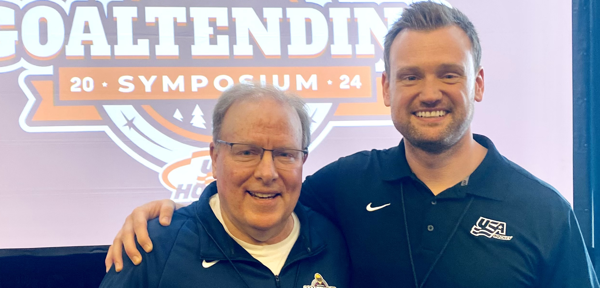Steve Carroll started out just wanting to help the goaltenders near his Minnesota hometown of Edina.
Carroll didn’t realize that his local concept would turn out to be so successful that it would become a national destination to the rest of the country.
For his impact on numerous goaltenders over the past 30 years, USA Hockeyrecognized Carroll with the 2024 Goaltending Development Award during the inaugural USA Hockey National Goaltending Symposium, a four-day event recently held in St. Paul, Minnesota.
“I’m very humbled and honored to be recognized by my peers for doing something that I really enjoy,” Carroll said. “I’ve been at it for a long time, but I enjoy doing it and obviously enjoy collaborating with the coaches. I enjoy watching the goalies and shooters participate and then follow them as they proceed after the camp. It’s pretty cool to know that the work we’ve been doing has had a role in their continued development.”
The symposium celebrated goaltending and provided a unique, in-depth educational opportunity for coaches. A star-studded lineup of elite-level goaltenders, goalie coaches and leaders in the industry from across the country spoke at the event
Carroll, who said he was humbled to be recognized at the national level, learned he was the recipient of the award alongside other attendees.
“I really had no idea that something like this was in the works,” Carroll said. “I was at the symposium like everyone else, they started reading the explanation for the winner of the award and it was kind of like, ‘Wait a minute, I think he might be talking about me.’”
Carroll is currently a goalie coach for the Gustavus Adolphus College women’s hockey team, which won the 2023 NCAA Division III national championship.
Carroll, a Minnesota high school standout at Edina East, played collegiately at Minnesota State University where he won the 1980 NCAA Division II national championship and was named Most Outstanding Player of the tournament. A two-time All-American, Carroll was a Top 10 finalist for the inaugural Hobey Baker Award, presented to the best player in men’s college hockey.
Carroll has more than a quarter century of goalie coaching experience. He isregarded as one of the top goaltender instructors in the Midwest. He serves as the goalie coach-in-chief for USA Hockey’s Minnesota District and started the Carroll Goalie School in 1995, where he has trained netminders from throughout the country across 20 states.
“We were thinking about what we can do for our Minnesota kids, but we realized nationwide that this was something that could be duplicated in other parts of the country,” Carroll said. “I wasn’t thinking nationwide when I came up with the idea. It was more about what can we do to specifically help our Minnesota kids. People would often refer to it as the Minnesota model. It was really cool to think that something you do on the local level would be copied and implemented across the country.”
Carroll is also the founder and director of Minnesota Hockey’s CCM High Performance Goalie and Shooting Camp. More than 20 years ago, his idea was to host a goalie development camp for the players.
“We brought in top-level coaches from various programs in Minnesota,” Carroll said. “We got some initial pushback because those were the early days of private coaches. But we thought [players were] going to be dramatically better after working with 15-to-20 different Division I and Division III goaltender coaches over the course of a weekend. It has been great exposure for the kids.”
Nearly 1,000 goalies have come through the program, and many have returned to coach. Washington Capitals goaltender Charlie Lindgren and Detroit Red Wings goaltender Alex Lyon all participated in the camp when they were in high school, as did Lauren Bench, who plays for PWHL Minnesota.
“The weekend has become really special for the participants,” Carroll said. “It’s unique enough that people remember the experience and if you bring it up, they have positive memories and want to give back to future goaltenders.”
It’s not just a goaltender camp anymore. It has grown into a shooting camp to also provide more realistic drills and ensure quality shooters to work with the goaltenders. Carroll explained that for the first 15 years of the camp, goalie coaches would serve as shooters. Now, shooters are added to the camp as participants, along with the goaltenders.
“Now the coaches can coach and don’t have to spend all day shooting,” Carroll said. “But it also gives the participants an opportunity to compete against similar skillsets and get into more of that game-like environment you can’t get if a coach is just firing pucks at you.”
Story from Red Line Editorial, Inc.



